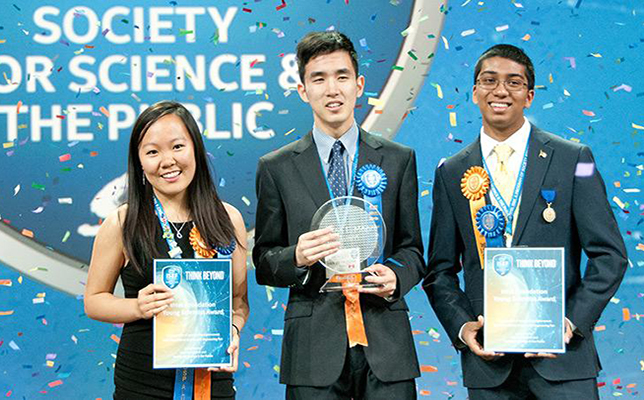Intel Withdraws Support for International Science and Engineering Fair

Grand Awards Winners stand at Intel ISEF 2016. Image Credit: The Society for Science and the Public.
Since their introduction in the 1940s, science fairs have become iconic to STEM education – with the International Science and Engineering Fair (ISEF) and the Science Talent Search (STS) being two of the premier competitions. Intel ended its support as the title sponsor for STS last year. Now, the tech company has dropped its support for ISEF and the competition’s organizers are looking for a new sponsor, The New York Times first reported.
Millions of high school students worldwide compete through hundreds of affiliate fairs to be one of the 1,800 finalists selected for the culminating ISEF competition, which is held in the spring. Since 1997, the competition has nearly tripled its reach, from 27 participating countries, regions and territories to 78 last year. Additionally, annual awards to participating students have increased from about $1 million in 1997 to about $4 million last year. In the last 20 years alone, the fair has awarded more than $80 million to participants by sponsors and awarding organizations.
Those numbers come from the Society for Science and the Public, a nonprofit that organizes both fairs. The Society announced Wednesday it is currently seeking a new title sponsor for the nearly 70-year-old international competition. The nonprofit is issuing a competitive process to find its new sponsor, which will need to commit $15 million annually for at least five years.
“We are at an inflection point,” said Maya Ajmera, president and CEO for the Society, in a prepared statement. “Our next sponsor has an extraordinary opportunity to inspire and impact future generations of scientific leaders, innovators and entrepreneurs. This competition and its affiliated science fairs held across the globe reach young people like no other program can, igniting their passion for science and their desire to discover innovative solutions to some of our world’s most intractable problems.”
Intel has not disclosed specifics yet on its decision to withdraw its support for either ISEF nor STS. However, the Times report said, “Intel’s move away from traditional science fairs leads to broader questions about how a top technology company should handle the corporate sponsorship of science.” For example, Intel has pledged support to other STEM initiatives, including its $300 million fund to attract more women and underrepresented minorities into the company – suggesting that increasing diversity in STEM is a top priority on the company’s agenda.
About the Author
Sri Ravipati is Web producer for THE Journal and Campus Technology. She can be reached at [email protected].